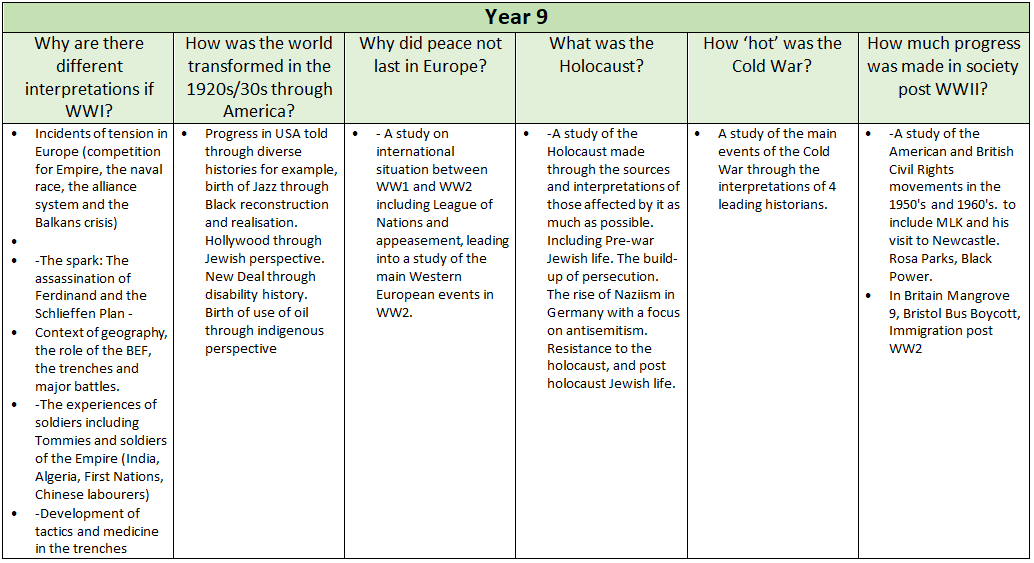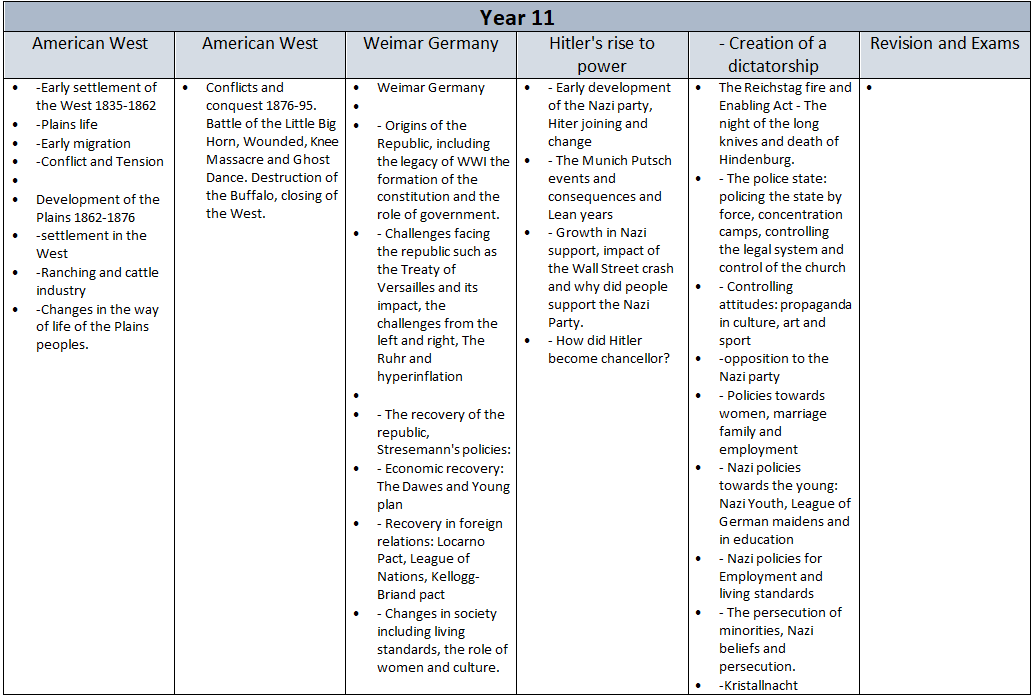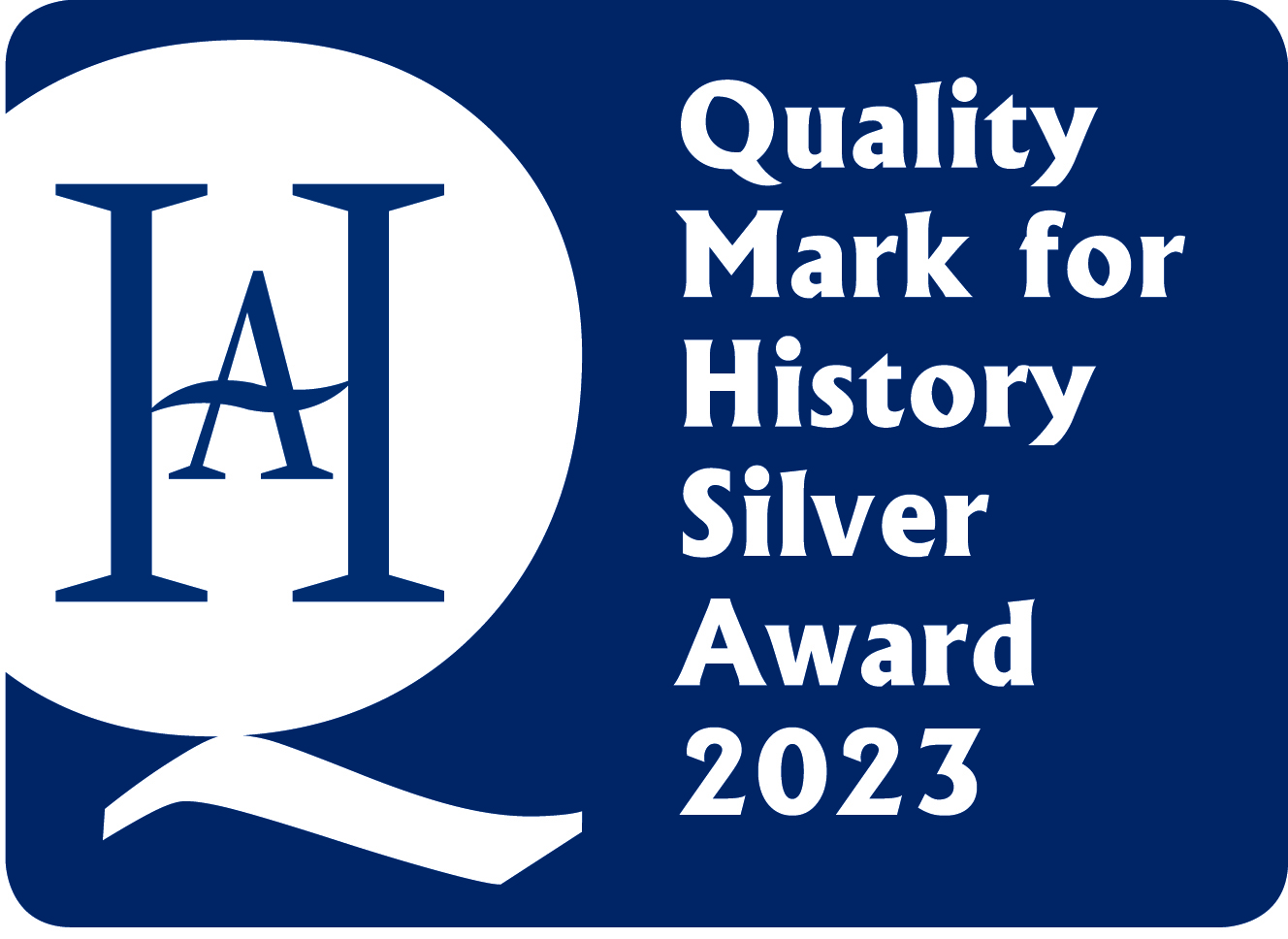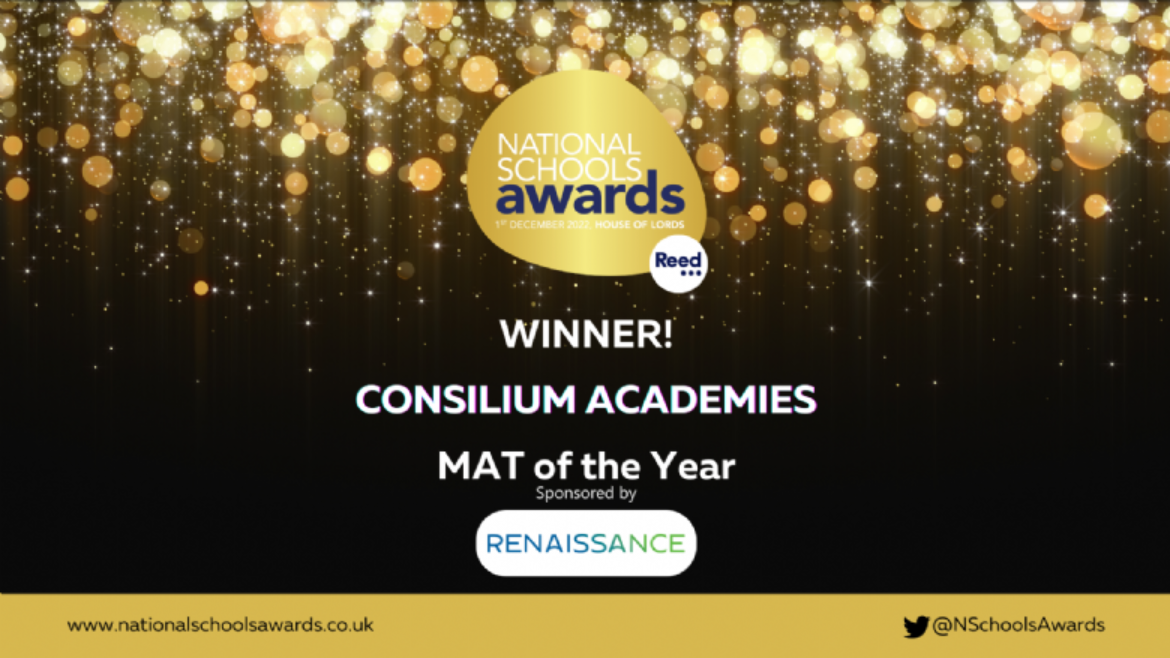History

Curriculum Intent
Our curriculum vision applies to all our young people, regardless of background, gender, sexual orientation, or ability.
Our department adheres to the thinking of historian Eric Foner that the teaching of History produces useful, critical thinking citizens.
In history our young people will develop a life-long love of learning through our rich, broad, balanced curriculum and expert delivery. They will access the knowledge and understanding of these islands as a coherent, chronological narrative from pre-1066 through topics such as Migration, to 20th Century history such as the World War One and Two, the Holocaust and the Cold War.
Our main threads:
- Society
- Of importance to our department is that our students will understand their roles in the school, local, national, and international societies, all of which they can be active members of.
- In all topics we will consider the local aspect. For example, our students to understand the NE’s role in Norman England, in TTEA, its contribution to WW1, etc. While also looking at global history, such as the world wars.
- Power
- How power is sought. How power changed over English and British history. How power corrupts some and how power allows others to achieve greatness for them and their societies. How empires are born, how they affect the colonised and the lead country. This will run from Year 7 when we look at Norman colonisation of parts of Europe and North Africa, Year 8 with our study of the British Empire and the Transatlantic Trade in Enslaved Africans (TTEA). In Year 9 we will see how Empire fuelled the First World War and how in the Cold War political dominance was sought within spheres of influence and opposing sides.
- How belief shapes peoples’ views and makes them act on positive and negative ways. We will study religious beliefs, which sparked change such as the English reformation and the English Civil War. We will look at political beliefs and the affects that has in forcing change, both positive and negative such as reform in the 19th Century, The Cold War ideologies, and the rise of Naziism.
- Migration
- Our curriculum will be a mirror and a window. Migration is a very human attribute yet remains contentious in modern society. We start in year 7 looking at migration to Britain, reasons why and effects on this island. This theme then continues with looking at the Normans as a migratory/ colonising group by focusing on the conquest of England and looking at their origins and other Norman migrations. Year follows this thread with the building of empire and the African diaspora. This continues into year 9 with a focus on forgotten soldiers in World War One and in the British and American Civil Rights studies. This then feeds into KS4 as the American West topic looks at the effect of settler colonisation on the American West’s Indigenous peoples and in the Normans topic.
- Environment
- We understand that one of the major concerns our young people have is about their environment. We want them to be able to tackle this issue with an understanding of how our history has affected the environment and how the environment has affected the history we study. Year 7 Migration looks at ‘push and pull’ factors including environmental ones. African Kingdoms considers how the environment shapes West African medieval culture. This comes into play when we look at Norman castles, battles, colonisation and industrialisation, the Cold War and nuclear conflict.
Their studies will encompass both the achievements and follies of humankind from surgical developments in World War One to significant historical events like the Holocaust. Students will examine the causes of such events and the impact that they had in the wider historical context.
All history students at Heworth Grange School receive a world class education that is holistic, ambitious, and aspirational. The history curriculum at Heworth Grange ensures that all students can achieve great depths of cultural capital and SMSC through the gaining of historical perspective.
At Heworth Grange we ensure that students are consistently developing the key skills and key historical concepts such as change/continuity, cause, and consequence, understanding interpretation and using evidence. We use them to make connections, draw contrasts, analyse trends, frame historically valid questions and create their own structured account, including written narratives and analyses. A good example of this is the Year 7 Normans, where students will use contemporary evidence, modern interpretation to understand the local, national, and international effect of the Norman expansion.
Through our challenging curriculum topics at KS3 and KS4 and the development of historical skills such as analysis, judgement and debate we ensure our young people are confident to pursue ambitious next steps in education and life.
To enable this, we are ensuring the development of literacy. Supplying all students with subject specific tier two and three vocabulary, writing [practice and equipping students with the literacy skills to engage with up-to-date scholarship and form their own historical interpretations.
Knowledge and skills:
Through our curriculum, students:
-
Develop confidence in communication skills and have opportunity to critically question and debate key aspects of history and historians.
-
Develop a love of reading.
-
Engage with interpretations, learning how historians form interpretations, form their own, why they differ and why the historical process is an ongoing journey.
-
Become confident working with contemporary material and study significant texts such as the Domesday Book or Magna Carta. They will analyse archaic language in order to develop their understanding of the laws and legislation of the past. They will critically analyse a variety of written texts to learn more about what life was like for people of the past.
-
Learn to self-regulate and work independently with clear scaffolding and support as well as collaboratively through pair and group work as well as class debate.
-
Will have the opportunity for deep thinking through challenging topics, concepts, and tasks and to get into their ‘flow’ through engaging lessons encouraging a passion for history.
KS3 Curriculum Overview
Click on the document at the bottom of this page to view an easy-read version of the full curriculum overview.



GCSE History
Overview
History is an engaging subject that is well respected by many colleges, universities, and employers. We provide a varied and interesting GCSE curriculum that also offers the opportunity for students to develop skills including the ability to communicate, how to express and explain complex ideas, analytical skills to help students understand information and viewpoints and how to form well-supported arguments. History students can access a diverse field of future careers; graduates often go into areas such as Law, Journalism, and Politics or into direct historical roles such as Archaeology or Museum and Heritage Management.
Topics
Thematic Study:
- Medicine in Britain, 1250- Present Day. Students will study the development of thinking about the cause and spread of disease in Britain from the medieval era through to the modern period. We will also study how public health changed, the development of cities and the creation of the NHS. There is a separate enquiry study into injuries, treatment, and surgery in the trenches during the First World War that will encourage students to use source evidence from that time period.
British Depth Study:
- Anglo-Saxon and Norman England: 1060-1088. This unit is an opportunity to study in depth a fascinating period of British history. Students will study Anglo-Saxon society and government, including the powerful Godwin family and the Kingship of Edward the Confessor. They will study the reasons for the crisis in 1066 and the three battles that decided the outcome: Gate Fulford, Stamford Bridge and Hastings. Students will then go on to examine the course of the Norman Invasion, analysing how William the Conqueror subdued England. Finally, pupils will compare the two systems of government and decide to what extent the Normans revolutionised England.
Period Study:
- The American West c.1835-1895 A study of American history during a crucial period. They will consider the lifestyle of the Plains Indians and, over a depth study of sixty years, explore how that lifestyle was changed by the different groups arriving and settling in the West. We will also consider some of the most iconic images of the Wild West, such as cowboys and gunslingers.
Modern Depth Study:
- Weimar and Nazi Germany, 1918-1939 This unit allows students to learn in much more detail about historical events with which they may already be familiar. We will study the political troubles in Germany following the First World War, the uneasy peace between World War I and II and the rise of the Nazi Party. A strong element of this unit is life in Germany under Nazi control, including methods to control the population, control of social aspects like literature, art and propaganda, and the persecution of minority groups.
KS4 Curriculum Overview
Click on the document at the bottom of this page to view an easy-read version of the full curriculum overview.


Course Structure
This GCSE is entirely examined – there is no longer a coursework element. Students sit their units across three exam papers at the end of Year 11. All students are entered for the same exam – there are no tiers of entry.
- Paper 1–1 hour 15 minutes: Medicine in Britain, C1250 - present and The British sector of the Western Front, 1914–1918: injuries, treatment, and the trenches.
- Paper 2–1 hour 45 minutes: Anglo-Saxon and Norman England C1060 - 1088 and The American West, C1835 - 1895.
- Paper 3–1 hour 20 minutes: Weimar and Nazi Germany, 1918–1939.
Additional Information & Who to Contact
Click here to view the History Specification
If you require any further information or have any questions, then please contact Mr Graham on heworthgrangeenquiries@consilium-at.com




